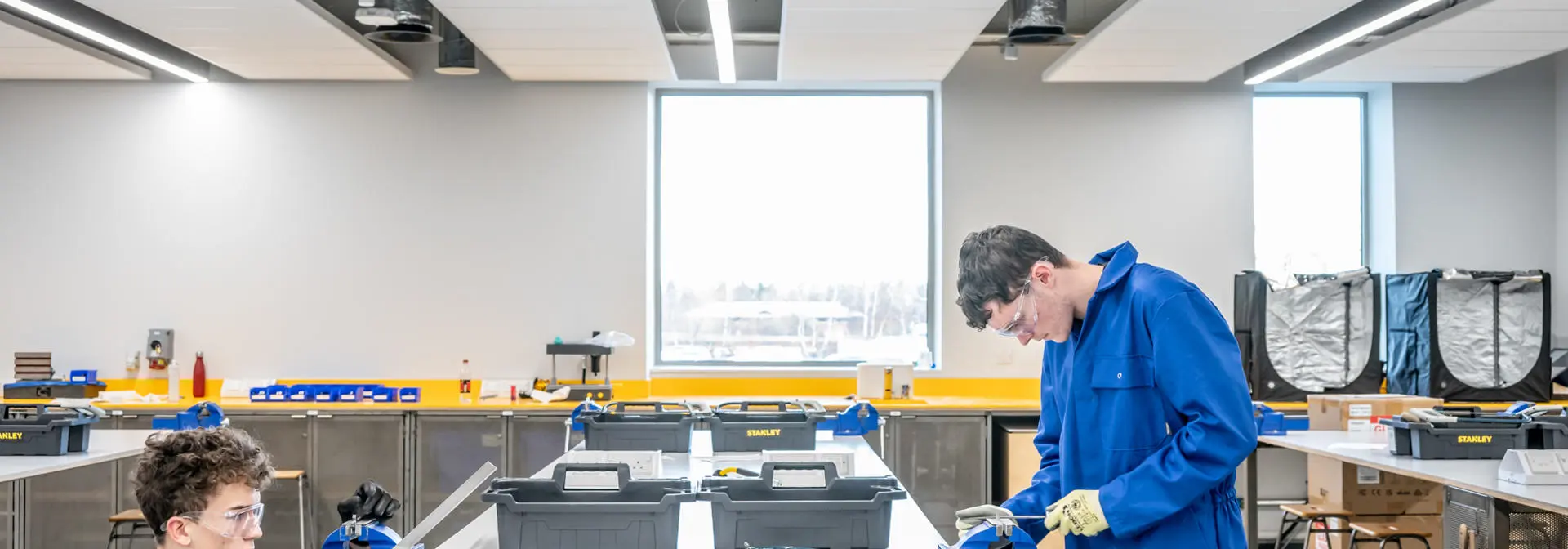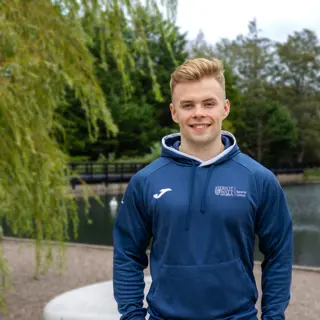Key information
Find out more about our 3 year honours degree option.
- UCAS code
- H300
- Level
- Undergraduate
- Delivery type
- Full Time
- Degree qualification
- BEng (Hons)
- Mode of delivery
- On-Campus
- Duration
- 3-4 years
- Location
- Edinburgh
- Start date
- September
The BEng (Hons) Mechanical Engineering encourages you to think creatively to solve the world's biggest challenges. From energy efficiency to tools for microsurgery, there is a need for mechanical engineers across a huge range of industries.
The undergraduate degree will equip you with a sound basis in theoretical engineering principles and methods and their application in the context of design and analysis. You’ll apply your subject knowledge and problem-solving skills to develop innovative solutions to the current and emerging problems facing society. You’ll have the opportunity to build and develop your professional network through industrial visits, and an optional industrial placement which, upon completion, will result in you being awarded a Diploma in Industrial Training (DIT). Throughout the programme, you will engage in hands on and practical work, and apply your learned theory. This will ensure you gain the practical skills demanded by industry.
During the programme, you’ll gain a broad knowledge of the core components in Mechanical Engineering Sciences and practices, studying modules including but not limited to mechanics, fields and forces, electrical engineering, mathematics, mechanical engineering, design and manufacture, fluid mechanics, mechanics of materials, thermodynamics, and sustainable development. You’ll have the opportunity to choose a handful of specialist engineering units to tailor your studies to your personal subject interests, and career ambitions.
In response to current industry changes and emerging trends, your learning will be built around the core concept of sustainability. You’ll learn how to engineer solutions that are environmentally, financially, and socially sustainable. Some examples include:
- designing turbines to generate electricity from geothermal or nuclear sources,
- creating heat pumps to replace gas boilers for a more efficient alternative,
- increasing the efficiency and performance of aircraft and transport,
- and improving medical engineering and nanotechnology.
Beyond gaining the fundamental knowledge of mechanical engineering, you’ll develop key transferable skills to set you up for a successful career in industry. By working both independently and across multidisciplinary teams on projects and assignments, you’ll gain key team working, professional presentation, and technical writing skills. You’ll explore key topics in business to develop insight global issues such as product life-cycle sustainability and financial viability.
You’ll have the opportunity to study an additional year, and progress onto the MEng Mechanical Engineering. This is the standard route toward a Chartered Engineering professional qualification.
Your student experience
Your learning will be informed by the expertise of our research-active mechanical engineers and academics.
96% of Heriot-Watt University’s engineering research was classed as world-leading in the REF 2021 review, which ranked us 1st in Scotland and 3rd in the UK for engineering research through a joint submission with the University of Edinburgh. Heriot-Watt has recently been ranked first in Scotland for General Engineering (The Times and The Sunday Times Good University Guide, 2023).
We were recently ranked 1st in Scotland for Mechanical Engineering in the Guardian University Guide 2026. Heriot-Watt University also achieved 2nd in Scotland for Mechanical Engineering in the Times and The Sunday Times Good University Guide 2026, reflecting the exceptional quality of our teaching, research, and industry engagement in the field.
Our BEng Mechanical Engineering is directly informed by the world class research carried out by Heriot-Watt’s Mechanical, Process and Energy Engineering (IMPEE) research institute which focuses on promoting excellence across four main research themes:
-
Biomedical Engineering
-
Digital Engineering
-
Energy Harvesting and Conversion
-
Multiphase Flow
The research relevance of this undergraduate programme ensures your studies remain cutting-edge and industry focused.
Go Global
With Go Global, Heriot-Watt's global student programme, you can carry your studies to new places and experience new cultures, expanding your horizons on the way. You'll discover what it means to be a true global citizen and emerge prepared for wherever your career journey will take you.
European Exchange
Worldwide Exchange
Course content
September Intake - Edinburgh
Year 1
Emphasis is on developing basic mathematical, scientific and communication skills. Topics include Mechanical Engineering Science, Physics, Introduction to Electrical Engineering, Programming and Foundation Mathematics.
Mandatory September
- Mechanics, Fields and Forces
- Introduction to Electrical and Electronic Engineering
- Engineering in Context 1
- Mathematics for Engineers and Scientists 1
Mandatory January
- Engineering in Context 2
- Introduction to Mechanical Engineering
- Mathematics for Engineers and Scientists 2
Optional January
- Waves and Matter
- Introduction to Aerospace Engineering
Year 2
Subjects include Strength of Materials; Machine Dynamics; Applied Thermodynamics; Fluid Dynamics; Materials Engineering; Design and Manufacture; Control Engineering; and Instrumentation.
Mandatory September
- Design and Manufacture 2
- Fluid Mechanics A
- Mechanics of Materials A
- Mathematics for Engineers and Scientists 3
Mandatory January
- Electrical Power and Machines
- Dynamics
- Thermodynamics A
- Mathematics for Engineers and Scientists 4
Year 3
Subjects include Strength of Materials; Machine Dynamics; Applied Thermodynamics; Fluid Dynamics; Materials Engineering; Design and Manufacture; Control Engineering; and Instrumentation.
Mandatory September
- Sustainable Development and Engineering Management
- Computational Fluid Dynamics and Incompressible Fluids
- Design and Manufacture 3
- Mechanics of Materials B
Mandatory January
- Design and Manufacture 4
- Vibration Analysis & Control Engineering
- Thermodynamics B
Optional January
- Automotive Technologies 1
- Energy Studies
Year 4
Students choose specialist subjects from Fluid Mechanics, Thermodynamics, Strength of Materials and Machine Dynamics. Mandatory courses include a year-long individual project plus Engineering Design and Manufacture that includes an industrial project. Other options such as Petroleum Engineering and Automotive Technologies are available.
Optional September
- Incompressible Fluid Dynamics
- Advanced Mechanics of Materials 1
- Dynamics 1
- Heat Exchangers and Heat Transfer
- Introduction to Petroleum Engineering
Optional January
- Compressible Fluid Dynamics
- Advanced Mechanics of Materials 2
- Dynamics 2
- Robotic Mechanical Systems
- Advanced Thermodynamic Applications
Mandatory AY
- Industrial Design and Manufacture
- Mechanical Engineering Individual Project
Disclaimer
The courses mentioned above may change between now and the time that you study. For more information, please view our Terms and Conditions.
Programme Video
Engineering at Heriot-Watt University
Student testimonials
See moreI’d looked at different universities in Scotland, but when I visited Heriot-Watt on a school trip, it really stood out. It felt personal — like the university was focused on what they could offer me, rather than just boasting about rankings or facilities. A lot of unis focus on selling rankings or shiny buildings. But Heriot-Watt felt different. It felt more student focused. It wasn’t just, ‘come here because we’re great.’ It was more like ‘this is what we can offer you’ — that felt more personal and genuine.
Fees and funding
| Status | Fee |
|---|---|
| Scotland | Paid by SAAS |
| England / Wales / N Ireland / Rep of Ireland | £9,790 |
| International | £25,808 |
- Status: Your residency status is usually defined as the country where you have been ordinarily resident for the three years before the start of your course.
- International: 'International' includes applicants from European Union countries who do not hold Pre-Settled or Settled status in UK. (This does not include students from the Republic of Ireland - see above).
Scholarships and bursaries
Bursaries for students from England, Northern Ireland or Wales
In addition to government loans and grants towards the costs of fees and living costs, we are offering generous financial support to attract and support eligible undergraduate students from England, Northern Ireland or Wales:
- Heriot-Watt University Bursary (up to £3,100 per year)
Entry requirements
We have standard entry requirements for all of our courses that you will have to meet.
Year 1
Standard entry requirements
- Highers AABB (over two sittings). Must include Maths and one of Physics or Engineering Science, with one required subject achieved at A.
- A-Levels BBC. Must include Maths and Physics, with both achieved at B.
- International Baccalaureate 29 points. Must include Maths and Physics, with both achieved at Higher Level 5.
- BTEC Extended Diploma DMM. Must be in a relevant Engineering subject including sufficient Maths and Physics.
- HNC A in graded unit. Must be in a relevant Engineering subject including sufficient Maths and Physics. All HNCs must include Engineering Maths 1 and one of Engineering Maths 2 or 3.
- HND AB / BA in graded units. Must be in a relevant Engineering subject including sufficient Maths and Physics. All HNDs must include Engineering Maths 1 and one of Engineering Maths 2 or 3.
- Please check that you meet our University-wide National 5/GCSE (or equivalent) English and Maths requirements.
Minimum entry requirements *
- Highers BBBC (over two sittings). Must include Maths and one of Physics or Engineering Science, with both required subjects achieved at B.
- A-Levels BCC. Must include Maths and Physics, with one required subject achieved at B.
- International Baccalaureate 29 points. Must include Maths and Physics, with both achieved at Higher Level 5.
- BTEC Extended Diploma DMM. Must be in a relevant Engineering subject including sufficient Maths and Physics.
- HNC B in graded unit. Must be in a relevant Engineering subject including sufficient Maths and Physics. All HNCs must include Engineering Maths 1 and one of Engineering Maths 2 or 3.
- HND BB in graded units. Must be in a relevant Engineering subject including sufficient Maths and Physics. All HNDs must include Engineering Maths 1 and one of Engineering Maths 2 or 3.
*Minimum: under our Fair Access Policy, we will relax our standard entry requirements for some Scottish and Rest of UK status students depending on their circumstances. Our minimum requirements will apply if you:
- live in an area within the Scottish Index of Multiple Deprivation lowest 20% (SIMD20) or POLAR4 Quintile 1 regions (RUK)
- or are care experienced.
We can also make exceptions for some Scottish students with grades above minimum but below standard. Read more about our Minimum and standard entry requirements.
Year 2
- Advanced Highers AB. Must include Maths and one of Physics or Engineering Science (plus Year 1 Higher requirements).
- A-Levels BBB to include Physics and Maths.
- International Baccalaureate 34 points. Must include Maths and Physics, with both achieved at Higher Level 6.
- BTEC Extended Diploma not available.
- HNC not available.
- HND AA (standard entry) or AB / BA (minimum offer eligible only). Must be in a relevant Engineering subject including sufficient Maths and Physics. All HNDs must include Engineering Maths 1, 2, 3 and 4.
- Global College Successful completion of our Engineering with Foundation.
Year 3
Entry to Year 3 is only available via our associate student partnership college route.
Additional information
- For all years, applications are welcomed from holders of non-school qualifications, mature candidates and overseas students.
- If you do not see your qualifications here please contact us at studywithus@hw.ac.uk
- For applicants studying HNC, HND or BTEC qualifications, when submitting your application please ensure you list in full all the units you are currently studying, as specific units (e.g. in Maths) may be required.
- Examples of a relevant HNC, HND or BTEC Engineering subject may include Mechanical Engineering / Mechatronics / Electrical Engineering / Engineering Systems / Engineering / Manufacturing Engineering."
English language requirements
If your first language is not English, we'll need to see evidence of your English language ability.
The minimum English language requirement for entry to this programme is IELTS 6.0 (or equivalent) with no score lower than 5.5.
If you do not have IELTS 6.0, we offer a range of English language courses to help you meet the English language requirement for this programme prior to commencing your studies.
Please see our detailed English language requirements.
Why Heriot-Watt
We're the top university in Scotland for graduate outcomes which means that more of our graduates are employed or in postgraduate education than any other institution in the country and we ranked 5th in the UK.
We're also rated number one in the UK for CEO or MD roles, meaning more of our graduates go on to become CEOs or MDs than any other university in the whole of the UK. On top of that, we have beautiful campuses, across the globe, so you'll get a truly international education. Our Edinburgh Campus is home to Oriam, Scotland's National Sports Performance Centre combined with plenty of wellbeing resources, prioritising fitness and mental health for all students. Our Global Research Institutes look at solving real world issues such as climate change and saving our oceans as well as working on the next medical technological breakthrough and the future of AI and robots.
Employability
Work and study
Salary
Potential career paths
- Engineering professionals
Student life
Explore facilities, and chat to staff and students
Discover Uni course data
Discover Uni provides data on each university's degree courses across a range of measures including student satisfaction, graduate jobs and salaries.







